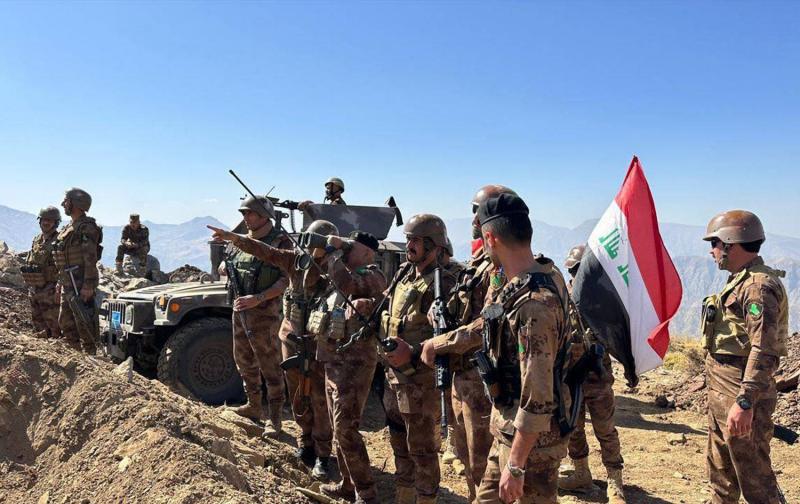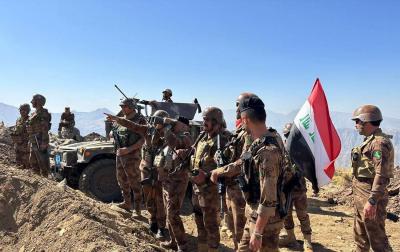Iran is intensifying its efforts to pursue Iranian Kurds abroad, whom it labels as "terrorists," demanding Baghdad hand over leaders and members of Iranian Kurdish opposition groups based in the Kurdistan region of Iraq. These groups have taken refuge in the semi-autonomous region for years. This escalation is part of Iran's campaign to secure its borders and pursue what it perceives as security threats. Kazem Gharib Abadi, one of the Iranian judicial officials, announced the delivery of a list containing approximately 120 Iranian Kurdish "terrorists," whom he described as "self-described noble Kurds." He confirmed that these names were submitted to the Iraqi authorities awaiting their extradition to Tehran, noting that preparations are underway to prosecute the "leaders and members" of what he referred to as a "terrorist group."
Although Gharib Abadi did not disclose the specific names on the list, Kurdish and Iraqi media reported that it includes names of leaders and members of Iranian Kurdish opposition groups against Tehran. Historically, these groups have sought autonomy within Iran, while some aim for separation from the Islamic Republic. Kurds constitute about 10% of Iran's population, with most residing in the western regions of the country along the border with Iraq.
This move is part of a broader counter-terrorism framework, according to Gharib Abadi, who confirmed that similar extradition requests will be sent to relevant foreign countries. However, these actions come after violent reactions to Iranian military operations in Iraqi Kurdistan, which included airstrikes targeting Iranian Kurdish opposition groups and alleged Israeli targets.
Kurdish opposition parties view these Iranian moves as an attempt to undermine the Kurdish independence movement. They believe that Iranian pressure on Baghdad stems from a security agreement signed between Tehran and Baghdad last year, which involves securing the lengthy border between Iraqi Kurdistan and Iran and disarming Iranian opposition groups based in the region.
Iran has previously launched multiple military operations in the Kurdistan region, including missile strikes targeting the Iranian Kurdish Democratic Party's headquarters in the Qushtapa area in 2018, resulting in the deaths of 15 party members and Peshmerga forces. In 2022, the Iranian Revolutionary Guard again targeted the Iranian Kurdish Democratic Party and the Komala group with missile strikes and drone attacks in Erbil and Sulaymaniyah. These operations have heightened tensions between Baghdad and Tehran, especially after Iran launched missile strikes in January 2023 targeting what it claimed were "Israeli sites" in Erbil, resulting in the deaths of four individuals.
Nevertheless, Kurdish leaders have sought to ease tensions. In May 2023, the President of the Kurdistan Region, Nechirvan Barzani, visited Iran and met with senior Iranian officials, including Supreme Leader Ayatollah Ali Khamenei. During this visit, Barzani committed to writing guarantees for the disarmament of "terrorist" groups and their removal from the Kurdistan region.
The Kurdish independence referendum in the Iraqi Kurdistan region in 2017 raised widespread concerns among neighboring countries, including Iran, Turkey, and Syria, which also have Kurdish populations. Although the turnout for the referendum was over 92% in favor of independence, the outcome did not lead to an immediate declaration of independence. Subsequently, the Iraqi army took control of Erbil and the oil-rich Kirkuk from Peshmerga forces, prompting the Kurdistan government to abandon the referendum and enter negotiations with Baghdad.
In light of these events, Iranian and Turkish pressures on the Kurdistan region increased. According to Sami Rikani, an independent political activist in the Kurdistan region, Iran and Turkey reached an unannounced agreement to confront Kurdish groups in the region following the 2017 referendum. These pressures also coincided with a security agreement Iraq signed with Turkey in 2016 to counter Kurdish opposition groups.
Considering the security agreement between Iraq and Iran, questions arise about whether Baghdad will respond to the Iranian request to extradite leaders and members of Iranian Kurdish opposition groups. So far, neither the Iraqi government nor the Kurdistan Regional Government has made any official comment regarding these requests.




